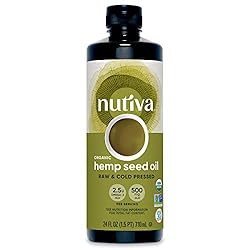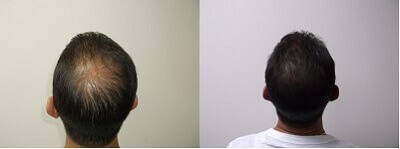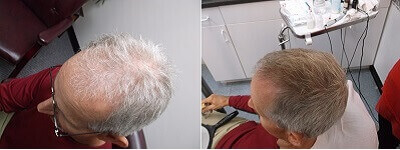
Update: See my new 2023 post on a CBD oil and hair growth testimonial. Also, I contacted Dr. John Satino and he sent me the before and after photos that I have posted below. The patients are taking cannabidiol rich hemp extract in an emu oil carrier. I have asked Dr. Satino if the second patient is dyeing his hair in the after photo or whether the CBD caused the darkening. Dr. Satino also sent me the following interesting update:
“This is a US Government Registered Study, found on ClinicalTrials.Gov (NCT04842383). I ran the original Minoxidil Study in 1984 for Upjohn, the Finasteride study for Merck in 1989 and the Lexington study for Low Level Laser FDA clearance in 2000. This study follows the required protocol, with scalp tattoo, hair counts , and microscopic hair analysis. The results so far are better than anticipated.
It is a 3 month, 6 month and 1 year study. Our previous study of post menopausal women in 2019 & 2020 showed much promise for the thirty plus participants. This study has enrolled 45 men & women, and we now have fifty percent of our group reaching the 3 to 4 month mark. Just a couple of before and after’s in that group. I will let you know as we get further along.”


CBD Oil, Hemp Oil and Hair Growth
These past few days, the biggest news in the hair loss world has been in regards to cannabidiol (CBD) rich hemp extract. All due to a new study titled “Hair Regrowth with Cannabidiol-rich Hemp Extract.”
On Reddit, this subject is getting daily coverage. e.g.,
The above mentioned study was authored by Dr. Gregory Smith and Dr. John Satino (who I covered in a past PRP and hair darkening post). The study was done on 35 subjects (28 males, 7 females) with androgenetic alopecia (AGA). Each patient used once a day topical hemp extract that contained about 3-4 mg of CBD. Note: CBD oil is often called hemp oil, which is different from hemp seed oil.
The conclusion of this study was insane:
“On average there was statistically significant 93.5% increase in hair after 6 months. All subjects had some regrowth. There were no reported adverse effects.”
“Since the CBD works through novel mechanisms different from finasteride and minoxidil it can be used in conjunction with these current drugs and would be expected to have synergistic effects.”
Men got slightly more growth than women with pattern hair loss. The vertex areas of scalps saw greater hair growth than the temporal areas.
The subjects were given a topical extract (in a 2-oz jar) to apply to the balding areas of their scalp once each morning. The jar was replaced at monthly visits throughout the six-month trial. Each 2-oz jar contained 108 mg of CBD. The subjects therefore used an average daily dose of 3-4 mg topical CBD.
The topical extract was made of high CBD cannabis sativa flower that had been ultra-pulverized into a fine powder. Per lab analysis, it contained 10.78% CBD, and 0.21% THC. There was no detectable THCV or CBDV. This powder was infused into a lanolin base paste and natural emu oil carrier.
Although the study was not funded by private company, it has two major deficiencies:
- No before and after photos. (Edit: No longer true. See update to the post at the top).
- No control group.
Considering the stupendous results of an almost doubling in hair count (i.e., 100 percent increase), I am very skeptical.
CBD and Hair Stimulation
However, while doing research on this subject, I noticed that there are a number of other supportive studies and articles on the internet. A lot of these suggests that CBD has some benefit when it comes to hair regrowth or at least cessation in hair loss. I remain very suspicious, but am surprised at the amount of information out there in relation to this subject.
Apparently, CBD could benefit hair growth through the endocannabinoid system (ECS); via its impact on the Wnt/β-Catenin pathway; and via influencing the cannabinoid receptor. According to the latest Satino study:
Existing research suggests that THC and other cannabinoid receptor 1 (CB1) agonists can be used to manage unwanted hair growth. At the same time, CB1 antagonists, such as CBD and tetrahydrocannabivarin (THCV) and cannabidivarin (CBDV) can be used to promote hair growth.”
Anecdotal reports suggest that CBD oil reduces anxiety, modulates cortisol levels and improves blood flow to the scalp. The last mentioned could just be an imagined effect. When I have four beers, my hair always feels amazing. I get a sensation that my whole body is calm, warm and experiencing much better blood flow. But the latter is definitely scientifically inaccurate.
CBD vs Hemp vs Cannabis vs THC
People often confuse Cannabidiol (CBD), Hemp, Cannabis (Marijuana) and Tetrahydrocannabinol (THC).
- CBD and THC are both one of 113 identified cannabinoids in cannabis plants. Both are increasingly used for pain relief, anxiety reduction, and symptom reduction from various medical problems. There are some debates about the benefits and long-term effectiveness of cannabinoids, but their popularity keeps growing globally.
- Cannabis is a plant from which one can make the Cannabis drug (also known as Marijuana).
- Hemp seed oil and CBD oil both derive from the cannabis plant. However, cannabidiol oil is made using the stalks, leaves, and flowers of the hemp plant. In contrast, hemp seed oil comes from the seeds of the Cannabis sativa plant. The seeds do not contain CBD. Nevertheless, hemp seed oil does contain omega-6 and omega-3 fatty acids; gamma-linolenic acid; B vitamins; vitamin D; and various antioxidants.
A Note on Natural and Alternative Treatments
I have covered related subjects in the past such as caffeine and hair growth as well as natural hair loss products. Most such hair loss treatments will never grow back hair on totally bald areas of the scalp.
However, some stimulatory effect on hair growth is quite possible from various herbal remedies and natural products. It should also be noted that even certain smells can grow or thicken existing hair due to the olfactory receptor.